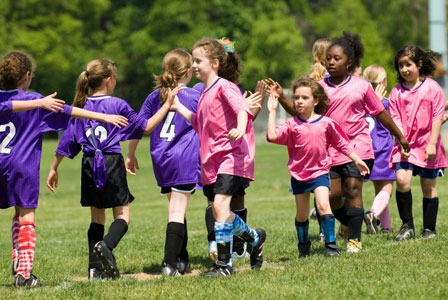
With parents encouraging their kids to compete with more intensity than ever before, youth sports sometimes get a bad reputation. Is there more to sports than just winning a trophy?
Why sports might make your child smarter
Research hints that exercise and sports activity may be good for your child’s brain, too.
Getting your kids involved in youth sports — think everything from tennis to soccer — is also a great way to encourage physical fitness. Children who participate in sports and other physical activities may be more likely to continue being physically active into adulthood. We all know that our children’s bodies are healthier when they are active, but what about their brains?
Brain benefits — size matters
How could your child’s brain benefit by simply participating in sports? Researchers from the Department of Psychology at the University of Illinois at Urbana-Champaign were interested in finding out if physically fit adolescents would outperform their less active peers on cognitive flexibility and working memory assessments.
"This is the first study I know of that has used MRI measures to look at differences in brain between kids who are fit and kids who aren't fit," said University of Illinois psychology professor Art Kramer, who led the study with doctoral student Laura Chaddock. "Beyond that, it relates those measures of brain structure to cognition."
Researchers analyzed the MRI data and found that children who were physically fit tended to have about 12 percent bigger hippocampal volume than their less fit peers. Both groups of children were measured on tests of relational memory — the ability to remember and integrate various types of information — and the physically fit children performed at a higher level than their less-fit peers. “A bigger hippocampus in 9 and 10-year-old children appears to boost their performance on a relational memory task,” said Chaddock.
Check out these brain boosting foods for kids>>
Test scores and fitness
How do these enhanced cognitive abilities translate to academics? Dawn Coe, a doctoral student in kinesiology at Michigan State University, led a study to determine if there was a connection. Published in December 2012 in the Journal of Sports Medicine and Physical Fitness, her group found that middle school students who are in the best physical shape scored higher on standardized tests and earned higher grades on report cards than their peers. Her study is the first linking children's fitness to both improved test scores and better grades overall. The results were true across the board, regardless of gender or whether the child had reached puberty. Researchers studied all aspects of physical fitness — percentage of body fat, flexibility, muscle strength and endurance. "We looked at the full range of what's called health-related fitness," said Coe. "Kids aren't really fit if they're doing well in just one of those categories."
Does your child suffer from standardized test anxiety? >>
What does this mean?
If your child is able to participate in youth sports activities, he will benefit from the experience in both physical and academic ways. The findings from these studies make a good argument against schools cutting physical education and recess time, which may be affecting students' academic performance and scores on standardized tests.
"That's the exciting thing, is if we can get people to listen and have some impact on public policy,” said James Pivarnik, a Michigan State University professor of kinesiology who advised Coe on the project.
“Making fitness a bigger part of children's lives also sets them up for future success,” Pivarnik adds. "Fit kids are more likely to be fit adults. And now we see that fitness is tied to academic achievement. So hopefully the fitness and the success will both follow.”
Bottom line
The benefits of youth participation in sports goes beyond learning to work together, following the rules, practicing good sportsmanship and making friends. Find an activity your child enjoys and encourage them to stay active, even in the off-season. Their brain may depend on it.
More physical fitness for kids
Kids fitness: The power of positive thinking
Family fitness: Fun ways to play your way into shape
Getting your sedentary children moving